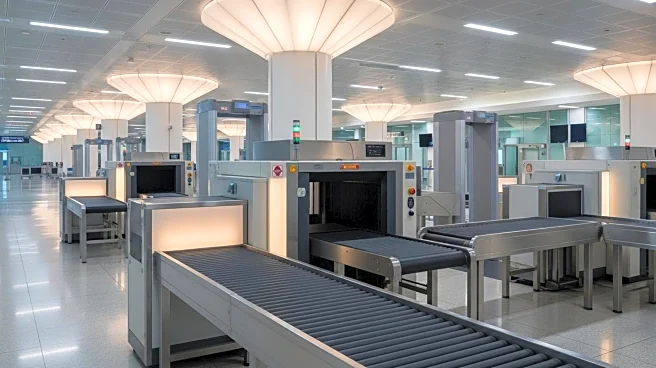What's Happening?
The Transportation Security Administration (TSA) has launched the One Stop Security pilot program, aimed at simplifying international travel for passengers flying to the United States. This congressionally authorized initiative allows eligible passengers from select foreign airports to bypass rescreening upon arrival in the U.S., streamlining connections and enhancing travel efficiency. The pilot began in July, initially including flights from London Heathrow Airport, with American Airlines connecting to Dallas-Fort Worth International Airport and Delta Air Lines arriving at Atlanta Hartsfield-Jackson International Airport. The program is a collaborative effort between TSA, U.S. Customs and Border Protection (CBP), and the United Kingdom, and is a priority for Homeland Security Secretary Kristi Noem.
Why It's Important?
The One Stop Security program is significant as it aims to reduce the complexity and time involved in international air travel, which can often be challenging for passengers. By allowing travelers to skip TSA rescreening and proceed directly to the terminal's sterile area after CBP inspection, the initiative is expected to improve the passenger experience and reduce costs. Additionally, it enhances aviation security at foreign locations by ensuring participating airports meet TSA-equivalent standards. This program supports President Trump's vision for a new Golden Age of American travel, emphasizing both efficiency and security.
What's Next?
As the One Stop Security pilot progresses, it may expand to include more foreign airports, potentially increasing the number of passengers who can benefit from streamlined travel processes. Stakeholders such as airlines and international airports will likely monitor the program's impact on travel efficiency and security. Further collaboration between TSA, CBP, and international partners could lead to additional enhancements in the program, aiming to further simplify and secure international travel.
Beyond the Headlines
The One Stop Security initiative may have broader implications for international relations and cooperation in aviation security. By setting a precedent for streamlined security processes, it could encourage other countries to adopt similar measures, fostering global standards in aviation security. Additionally, the program's success could influence future policy decisions regarding international travel and security protocols.








